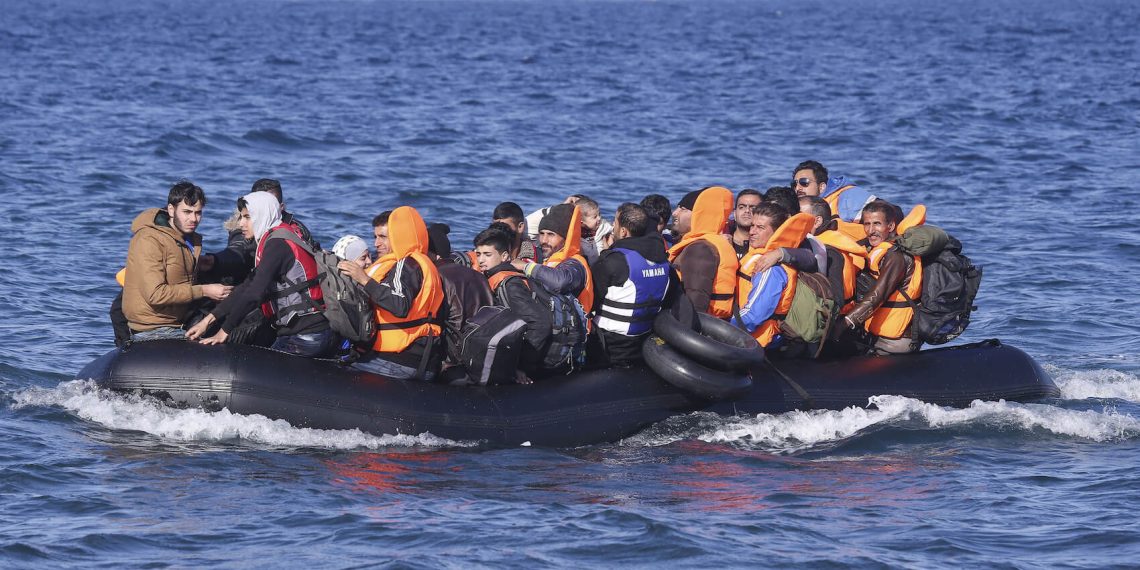Statistics on the EU migration crisis indicate that over 3,000 lives have been lost in the Mediterranean Sea, with 60% of the deaths linked to drowning. However, these figures are not precise, many ‘ghost boats’ disappear from radar with no record of the number of migrants on board. Indeed, the majority of migrant deaths worldwide go unrecorded.
In recent years, Europe has witnessed a large number of migrants risking their lives in search of better life and opportunities. Tragically, this search sometimes results in death. The danger of this route is too great to ignore, and this paper aims to examine the intersection between migration policies, populism, human rights, and the escalating number of deaths.
In the last decade, Europe has faced an unprecedented number of migrants attempting to cross its borders, particularly via the Mediterranean Sea, which is infamous for being the deadliest migration route. The number of deaths is alarming; in 2023, the total number increased by 20%, making it the deadliest year for migrants since the International Organization for Migration (IOM) began keeping records (IOM Report, 2024). Statistics on the EU migration crisis indicate that over 3,000 lives have been lost in the Mediterranean, with 60% of the deaths linked to drowning. However, these figures are not precise, as the IOM explains, many ‘ghost boats’ disappear from radar with no record of the number of migrants on board. Indeed, the majority of migrant deaths worldwide go unrecorded (Migration Data Portal, 2024).
Populist Migration Policies to Blame for Increasing Death Tolls
To understand the reasons behind the rising death toll and the increasing number of migrants taking more dangerous routes, it is necessary to examine the interaction between these deaths and populist migration policies. The growing popularity of populist politics across Europe has dramatically impacted migration policies. Populist policymakers are known for their nationalistic rhetoric, which fosters fear of the unknown and of those who are different. Border protection policies are a central element of populism, prioritizing border security over human lives. This results in policies that focus on protecting borders rather than saving the lives of those fleeing unstable states, poverty, or wars (Osuna, 2022). When countries restrict legal routes for refugees, they force individuals to undertake even more perilous journeys to reach safety (Oxford, 2024).
The externalization of border control by populist governments often involves proposing migration deals to improve partner countries’ border management and migrant interception capabilities. Examples of these policies include the recent bilateral agreement between Italy and Albania signed by Italian populist Prime Minister Giorgia Meloni, and a similar agreement with Libya, primarily signed by former populist Prime Minister Silvio Berlusconi (Martini & Megerisi, 2023). These agreements shift the responsibility of handling migrants to third-party states, which do not always respect fundamental human rights or adhere to the Geneva Convention. Populist migration policies are frequently criticized by international human rights organizations for violating international laws and agreements on asylum and refugee rights (Muižnieks, 2017).
The migration policies followed by populist governments, which often result in more deaths, include measures such as refusing docking rights to rescue ships. A notable example of this was the ‘Sea Watch Case’ in Italy. The then Italian Interior Minister, Matteo Salvini, did not permit the docking of the NGO “Open Arms” rescue ship. However, the ship’s captain, Carola Rackete, defied his orders and docked anyway, sparking a legal dispute about the interpretation of humanitarian aid for migrants with sanitary needs. The policy of denying docking rights to ships in the European Union after a long and perilous journey often leads to more deaths in the Mediterranean Sea due to delayed responses from authorities. It is crucial to highlight the dangerous situations that delayed responses create for migrants arriving in the EU on illegal boats. Late actions by the European Border and Coast Guard Agency (FRONTEX) or national authorities can result in shipwrecks, such as the one that occurred in Cutro, Italy, on the night of February 25, 2023.
Border States’ Responsibility to Save Lives: The Italian Example
Populist parties in Mediterranean countries such as Spain, Italy, and Greece are known by the EU Commission (Triandafyllidou, 2013) for emphasizing migration issues more strongly than other EU states, as these border countries are more affected by the illegal arrival of irregular ships. The increase in deaths is linked to the inadequate response of these states often lacking the resources and infrastructure to cope with the influx of arrivals. For example, the Italian approach to the migrant crisis has gained significant attention and generated controversy, with their closed-border policies raising critical humanitarian concerns. Italy has been a primary destination for migrants coming from North Africa and the Middle East.
The new regulations, which are part of the migration policy followed by Italian PM Meloni to prevent irregular migration, reduce the possibility of multiple rescues and introduce sanctions and administrative measures for violations. These measures have consequently led to an increase in deaths on the Mediterranean Sea. By closing ports and restricting rescue operations, Italy has effectively left thousands of migrants stranded at sea in dangerous conditions, as seen in the Cutro catastrophe. This fatal incident occurred just three days after the approval of the restrictions on NGO rescues. The cause of this shipwreck was Italy’s delayed response following the FRONTEX report of a ship needing rescue. The Italian authorities approached the situation as a police operation to stop irregular migration, not as a humanitarian mission (Pons, 2023). Despite the application of this new regulation, in 2023, Italy experienced a 50% increase in migrants arriving by sea compared to 2022.
Conclusion
As noted in the analyzed example of Italy, populist governments justify stringent migration policies as necessary for their national security and sovereignty. However, they often do not respect international refugee and migration law and fundamental human rights. The protection of borders, fueled by populist agendas, perpetuates and maintains a lack of empathy towards the deaths during the migration process, reducing these tragedies to mere numbers in European newspapers. Furthermore, populist agendas create and perpetuate a narrative of "us versus them," neglecting the ethical imperative to protect human rights. This undermines European credibility as an exemplar of human rights advocacy on the global stage. The escalating number of deaths at EU borders is a stark reminder of the human cost of racist and restrictive migration policies driven by populist agendas. To prevent further deaths, the EU must adopt an approach that prioritizes protecting human rights, human lives and fosters international cooperation to avoid casualties.
References
Oxford, D. (2024). “Why refugee deaths at an all-time high.” Al-Jazeera. March 8, 2024. https://www.aljazeera.com/news/2024/3/8/why-are-refugee-deaths-at-an-all-time-high (accessed on May 15, 2024).
Osuna, J. J. O. (2024). “Populism and Borders: Tools for Constructing ‘The People’ and Legitimizing Exclusion.” Journal of Borderlands Studies, 39(2), 203–226. https://doi.org/10.1080/08865655.2022.2085140
Black, J.; Warner, K.; Manke, M.; Borja, M.G.; Abdelazim, M. & Sigman, Z. (2024). A Decade of Documenting Migrant Deaths: Data analysis, and reflection on deaths during migration documented by IOM’s Missing Migrants Project,International Organization for Migration. Berlin. https://missingmigrants.iom.int/MMP10years (accessed on May 15, 2024).
Martini, L.S. & Megerisi, T. (2023) “Road to Nowhere: Why Europe’s Border Externalisation is a Dead End.” European Council on Foreign Relations. https://ecfr.eu/publication/road-to-nowhere-why-europes-border-externalisation-is-a-dead-end/ (accessed on April 15, 2024).
Migration Data Portal. (2024). Migrant deaths and disappearances. https://www.migrationdataportal.org/themes/migrant-deaths-and-disappearances (accessed on April 16, 2024).
Muižnieks, N. (2017). Populism? Human Rights Regression and the Role of the Ombudsman. Keynote Speech at IOI Europe Conference, Barcelona. https://rm.coe.int/16807095ff (accessed on May 20, 2024).
Pons, L. (2023). “Naufragio di Cutro, cosa è successo: la dinamica e le responsabilità." Fanpage. June 7, 2023. https://www.fanpage.it/politica/naufragio-di-crotone-cosa-non-ha-funzionato-nella-catena-dei-soccorsi-ai-migranti/ (accessed on May 15, 2024).
Triandafyllidou, A. (2013). “Migration policy in Southern Europe: challenges, constraints and prospects.” European Website on Integration. October 18, 2013. https://migrant-integration.ec.europa.eu/library-document/migration-policy-southern-europe-challenges-constraints-and-prospects_en (accessed on May 20, 2024).


